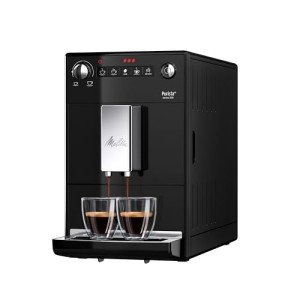The 10 Most Scariest Things About Home Use Espresso Machines
Home Use Espresso Machines: A Comprehensive Guide
Espresso machines have actually become a staple in many households as coffee enthusiasts seek to reproduce café-quality brews in the convenience of their kitchens. The rise in appeal has actually caused a varied market filled with numerous models, features, and costs. This short article aims to provide a useful introduction of home use espresso machines, assisting readers navigate their alternatives efficiently.
Comprehending Espresso Machines
Espresso machines work by requiring warm water through finely-ground coffee under high pressure, resulting in a concentrated coffee beverage referred to as espresso. There are a number of types of espresso machines categorized based on their brewing methods and level of automation. The most common types consist of:
Manual Espresso Machines: These require the user to manage the pressure and water circulation, permitting a more hands-on coffee-making experience.
Semi-Automatic Espresso Machines: These provide automatic control over water pressure, while the user by hand grinds and tamps the coffee.
Automatic Espresso Machines: With the push of a button, these machines immediately manage the flow of water, making it simpler to brew espresso with consistent results.
Super-Automatic Espresso Machines: These all-in-one machines deal with grinding, tampering, brewing, and even milk frothing, making them perfect for users trying to find convenience.
Capsule or Pod Machines: These use pre-packaged coffee pods to develop espresso with very little effort, however they restrict option in brewing strategies and tastes.
Table: Comparison of Espresso Machine Types
Type
Control Level
Reduce of Use
Cleaning Level
Perfect For
Manual
User-controlled
Moderate
High
Coffee perfectionists
Semi-Automatic
Partial automation
Moderate
Moderate
Home baristas
Automatic
Fully automated
Easy
Low
Busy people
Super-Automatic
Completely automated
Really simple
Very low
Convenience applicants
Capsule/Pod
Fully automated
Really simple
Very low
Casual drinkers
Secret Features to Consider
When choosing a home use espresso machine, it's important to think about various features that can significantly affect the quality of espresso and user experience.
Pressure: Look for machines that supply a minimum of 9 bars of pressure, as this is thought about optimal for brewing espresso.
Boiler Systems: Single vs. dual boiler systems identify temperature stability and the capability to brew espresso and steam milk concurrently.
Grinder: Integrated grinders permit freshly ground coffee, which enhances taste. Think about machines with adjustable grind settings.
Milk Frother: For those who enjoy cappuccinos and lattes, a built-in steam wand or automatic frother is essential.
Size and Design: Consider your cooking area area and aesthetic choices. Machines can be found in numerous sizes, from compact to big setups.
Price: Home espresso machines can vary from a few hundred to numerous thousand dollars, so it's essential to develop a budget before checking out options.
Advantages and disadvantages of Home Use Espresso Machines
Pros
Cons
Benefit of brewing coffee in the house
Initial financial investment can be high
Quality of espresso is frequently superior
Requires some ability, especially with manual machines
Capability to explore tastes
Maintenance and cleansing can be labor-intensive
Can save money in the long run
Not all machines will suit every coffee preference
Upkeep and Cleaning Tips
Preserving an espresso machine is crucial for prolonging its life and ensuring constant brew quality. Here are some helpful pointers:
Regular Descaling: Minerals from water can develop in the machine. Compact Espresso Machines -3 months, depending on water hardness.
Daily Cleaning: Rinse portafilters, baskets, and steam wands after each use to prevent coffee oils from constructing residue.
Use Filtered Water: This can help in reducing mineral buildup and improve the taste of coffee.
Change Gaskets and Seals: These parts may wear out over time and must be replaced to keep pressure and efficiency.
Check out the Manual: Each machine has particular care guidelines; following these will ensure durability.
Frequently Asked Questions About Home Use Espresso Machines
**Q1: What is the best budget espresso machine?The best budget espresso machine typically depends upon individual requirements, however designs like the DeLonghi EC155 or the Breville Bambino are popular amongst users for offering great value. Q2: How long do home espresso machines typically last?With appropriate maintenance, home espresso machines can last anywhere from 5 to 15 years, depending upon the quality of the machine and frequency of use. Q3: Can I make cappuccinos and lattes with any espresso machine?While most espresso machines can make coffees and lattes, having a reputable
steam wand or frother is important for achieving the right milk texture.
Q4: Are super-automatic machines worth the investment?For those who prioritize convenience and quick developing, super-automatic machines can be worth the financial investment, though they might lack some customizability in brew strength and taste. Q5: What kinds of coffee beans are best for espresso?While personal preference plays a function, beans identified as” espresso “blends are usually roasted darker, creating rich tastes and a creamy texture when brewed.
Investing in a home espresso machine can transform the day-to-day coffee routine into something unique, raising home brews to café quality. By understanding the various types of machines, key functions to consider, maintenance needs, and weighing the
pros and cons, customers can make informed choices that match their private preferences. As the espresso culture continues to grow, no matter the choice, every brew can be a delicious experience waiting to be savored.  **
**